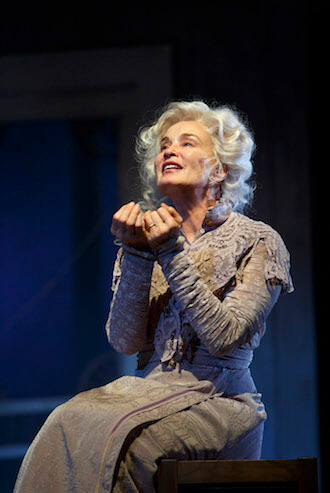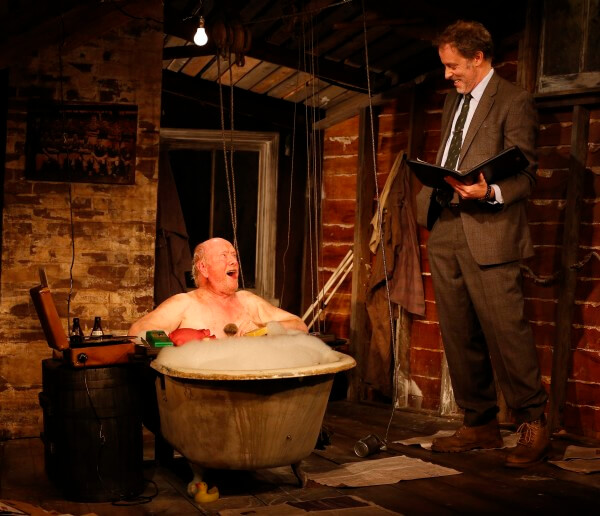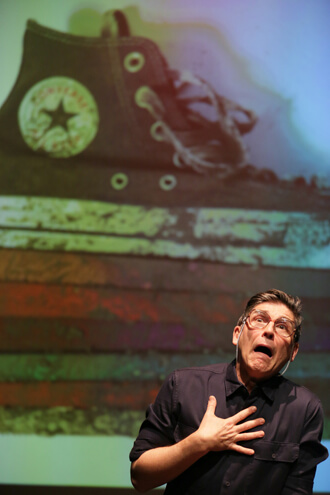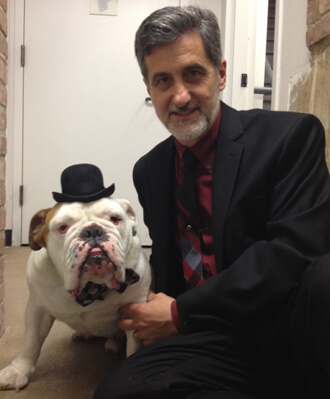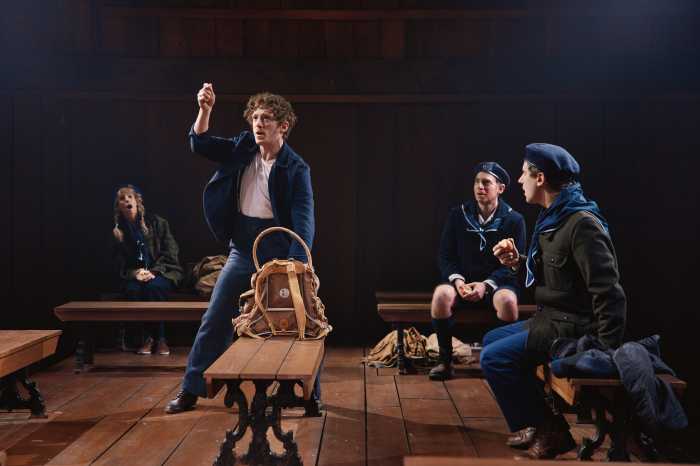Benjamin Walker in Roberto Aguirre-Sacasa and Duncan Sheik’s stage adaptation of Bret Ellis Easton’s 1991 novel “American Psycho.” | JEREMY DANIEL
The best satire has truth at its core. If you want to plumb the source of today’s narcissistically isolated and social media-obsessed culture, where attention is a kind of currency and FOMO (fear of missing out) has recurring emotional costs, look no further than “American Psycho.” Bret Easton Ellis’ 1991 novel has been transformed into a dazzling, trenchant, and darkly delicious musical with a book by Roberto Aguirre-Sacasa and music and lyrics by Duncan Sheik.
The essential question asked by Patrick Bateman is “do I exist and how do I know?” Subsumed in a culture of appearances and consumption, Patrick makes a lot of money in investment banking, but he is essentially a cog in a wheel, creating nothing and contributing less. His frustration and rage drive him into a murder spree as if that offers the only way he can know he is alive.
Never having read the novel or seen the movie, this material was completely new to me, though anyone who was around when the book first came out certainly was aware of the controversy it caused. What’s so captivating about the musical is that it both perfectly encapsulates the novel’s era and comments on contemporary issues. The Walkman has given way to iPhone buds and being seen in the right restaurant has become a count of Instagram followers and likes, but today’s hyper-connected world offers the same alienation — in fact, to a far greater degree — that Patrick suffered from a quarter century ago. It is both shocking and exhilarating to see him take matters into his own hands with rope, knife, and chainsaw.
Two emotional roller coasters — one contemporary, one classic
Sheik’s score is inspired with a wonderful sense of the music of the period, integrating songs such as “Hip to Be Square” and “Don’t You Want Me,” which acquires a fairly sinister aspect in this context. Es Devlin’s set design is appropriately ice cold, and Katrina Lindsay’s costumes pay homage to the period while also working as a cohesive whole. Justin Townsend’s lighting has a chill that reflects Patrick’s internal struggle, and Lynne Page’s choreography is evocative, precise, and powerful.
Then, of course, there is Benjamin Walker as Patrick. He meets the extreme physical challenges of the role with an increasingly intense level of desperation and panic. The tone of the piece shifts gears in the second act, from Grand Guignol to an internal journey for Patrick, but Walker takes us with him, evoking empathy and compassion for his bloodshed and allowing our darker fantasies to unwind.
The supporting cast is equally impressive, notably the men who surround Patrick, including Theo Stockman as Patrick’s superficial colleague, Tim Price, and Drew Moerlein as his nemesis, Paul Owen.
The show recalls another bloody musical about a man lost in his world, “Sweeney Todd.” In both, murder is revenge upon a world that marginalizes and cares nothing for the individual, and its cathartic dramatic power is inescapable. Revenge typically may indeed, as the saying goes, be a dish best served cold, but in the case of “American Psycho,” it’s just plain hot.
Jessica Lange in Jonathan Kent’s production of Eugene O’Neill’s “Long Day’s Journey into Night.” | JOAN MARCUS
For a contemporary audience accustomed to 90-minute plays, quasi-cinematic scene structure, and stories of narrow scope, the nearly four hours of Eugene O’Neill’s “Long Day’s Journey Into Night” can be daunting and demanding. Though the writing is often gorgeous and grimly lyrical, not much action takes place; stylistically, it’s as distant as Shaw or Shakespeare.
Like Shaw, the characters are often used as polemical tools rather than being fully developed, and like Shakespeare, the complexity of the language and the literary references reflect the sensibilities of another time. The play is a revered and “important” classic to be sure, but it also runs the risk of being a museum piece rather than vibrant and immediate theater. Jonathan Kent’s new production at the Roundabout for all its moments of breathtaking theatricality remains emotionally aloof, impressing the audience but never quite fully engaging it.
We watch the Tyrone family fall apart over one long day as morphine addiction claims the mother, Mary, and wreaks collateral damage on the lives of her one-time matinee idol husband, James, and her two adult sons, Jamie and Edmund, both of whom are still dependent on the family for their livelihood. Jamie is a failing actor, and Edmund is in the first stages of tuberculosis. The three men are alcoholics as well, and the cyclical family dynamics of denial, blame, suppressed rage, explosions, and apologies play out repeatedly. The hope that Mary, just back from a sanitarium, can stay free of morphine is quickly dashed, laying bare the depressed and hopeless state in which the entire family lives. They live in a constant fog, a persistent image in the play, set on the Connecticut coast in 1912.
Given the challenges of mounting this play, casting is essential to a successful production. Jessica Lange is stunning as Mary. Her portrayal is one of remarkable detail and nuance, as she grasps for the past that she thought was happy even as she is swept out to sea on waves of morphine. Gabriel Byrne is also excellent as the patriarch James Tyrone who, though a Broadway star for decades, is still tormented by his past lived in poverty and the fear of ending up in the poorhouse. For James, fear and bombast are two sides of the same coin, and Byrne beautifully embodies a man trapped between the two.
Less successful are Michael Shannon as Jamie and John Gallagher, Jr. as Edmund. Shannon, who incidentally looks like he came from a different family altogether, seems petulant and artificial for most of the play. His climactic scene is very well done, but it doesn’t evolve from what has gone before; it feels like a set piece injected into the proceedings. Gallagher seems to be in a different play. His contemporary acting style is inconsistent with the other members of the company, and he begins at such a high pitch, there’s really nowhere to go, which makes the play seem even longer than it is.
At one point, Edmund says, “Christ, you have to make allowances for this damned family or go nuts.” That’s true of most families, but audiences shouldn’t have to feel that way in the theater.
AMERICAN PSYCHO | Schoenfeld Theatre, 236 W. 45th St. | Sun.-Tue., Thu. at 7 p.m.; Fri.-Sat. at 8 p.m.; Sat.-Sun. at 2 p.m. | $67-$147 at telecharge.com or 212-239-6200 | Two hrs., 45 mins., with intermission
LONG DAY’S JOURNEY INTO NIGHT | Roundabout at the American Airlines Theatre, 227 W. 42nd St. | Through Jun. 26: Tue., Thu.-Sat 7 p.m.; Sat. at 1 p.m.; Wed., Sun. at 2 p.m. | $67-$147 at roundabouttheatre.org or 212-719-1300 | Three hrs., 45 mins., with intermission

